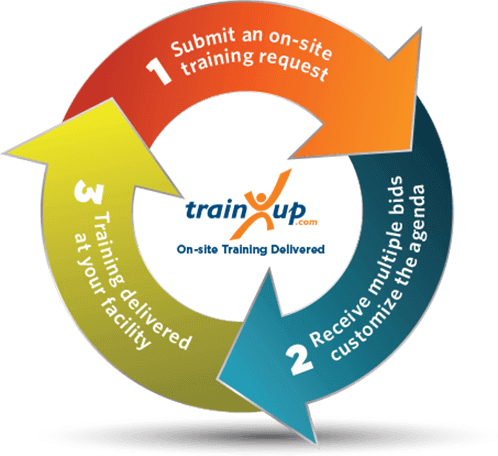
Communication Training Your Way
Or Choose From 29 Business Skills Sub-Categories
- Accounting Training
- Administration Training
- Advertising Training
- Business Analysis Training
- Business Coaching Training
- Business Intelligence Training
- Business Writing Training
- Communication Training
- Conflict Management Training
- Contract Management Training
- Customer Service Training
- Entrepreneurship Training
- ISO Standards Training
- Leadership Development Training
- Management Training
- Managing Remote Teams Training
- Marketing Training
- Microsoft Office Training
- Organizational Development - OD Training
- Personal Development Training
- Presentation Skills Training
- Project Management - PMP Training
- Sales Training
- Six Sigma Training
- Social Media Training
- Supervisor Training
- Team Building Training
- Time Management Training
- Women In Leadership Training
Communication Training, Public Speaking Courses and Seminars
TrainUp.com is your one-stop source for the best virtual communication training and live courses nationwide. Start your search now and browse among 39 live instructor-led communication training classes near you, from the industry's best communication training companies such as SkillSoft, BizLibrary, and American Management Association International TrainUp.com also lists more than 254 self-paced online communication training courses, micro-learning videos, and eLearning bundles. If you have a team to train, we can conduct a course just for you. Check out our onsite on-site communication training page to request a custom virtual or in-person training quote today.
Request Communication On-Site Training. We bring the best instructors to you.
TrainUp.com is your one-stop source for the best virtual communication training and live courses nationwide. Start your search now and browse among 39 live instructor-led communication training classes near you, from the industry's best communication training companies such as SkillSoft, BizLibrary, and American Management Association International TrainUp.com also lists more than 254 self-paced online communication training courses, micro-learning videos, and eLearning bundles. If you have a team to train, we can conduct a course just for you. Check out our onsite on-site communication training page to request a custom virtual or in-person training quote today.
Live Training
(32 Classes)
Self-Paced Courses
(173 eLearning Courses)
& Video Collections
(101 Bundles)
Up to 37% off Training
Confidence Building Skills for Women
Doing It All: How to Stay Focused and Engaged
Tips for Giving and Receiving Feedback
Effectively Communicating in The Moment
Assertiveness Training
Strategic Thinking
How to Flex Your Communication Style
Strategies for Developing Effective Presentation Skills
Storytelling Power: Secrets for Exceptional Communication
Effective Executive Speaking
Building Better Work Relationships: New Techniques for Results-Oriented Communication
Presentation Skills Workshop
How to Communicate with Diplomacy Tact and Credibility
Assertiveness Training for Women in Business
The Effective Facilitator: Maximizing Involvement and Results
Mastering the Art of Critical Conversations
Facilitating an Effective Strategic Planning Process
Project Team Leadership: Building Commitment Through Superior Communication
Communication and Interpersonal Skills for Technical Professionals
Business Communication Certificate Program
Responding to Conflict: Strategies for Improved Communication
Communicating with Confidence
How To Communicate With Tact And Professionalism
How to Influence Using Personal Power
Leading Effective Virtual Meetings
Workplace Communication Training
Public Speaking Strategies
Communicating Interpersonally: Mastering the Fundamentals of Interpersonal Communication Ed.1
Understanding Communication Dynamics to Build Your Professional Credibility
Communicating With Consistency and Accuracy
Communication for HR Professionals
Improving Nonverbal Communication
You have Two Ears and One Mouth - How to Be a Better Listener
How to Build a Professional Brand and Image
The 21st Century High Performance Workplace: Cultivating Communication and Action in Your Employees
Speech Writing Stress and Public Speaking Strategies
Interpersonal Communication Part 1
Fundamentals of Cross Cultural Communication
Public Speaking Strategies and Handling Pressure
Email Communication Video Collection
Project Scheduling and Communication PMBOK® Guide Fifth Edition
Communication Essentials Video Collection
Skills for Communication Success
Interpersonal Communication
Communication Success Essential Skills
Communicating with Diplomacy and Tact
Communication Skills for Managers
Becoming a Better Communicator
Crisis Communication for Managers
Interpersonal Communication Part 2
Certified Manager of Quality Organizational Excellence Part 1
Project Communications and Stakeholder Management (PMBOK® Guide - Fifth Edition)
Managing during Difficult Times

Get Up to 20% off Live & Online Training Courses

We’ll Conduct The Course Just For Your Team

Get Up to 20% off eLearning
SCORM /AICC compliant. Upload content to your LMS
We’ll help customize your curriculum. Send us a request today to preview our entire online training catalog

Customized eLearning Solutions
ILT /Virtual Live to eLearning MicroLearning Video Development Mobile Learning Gamified Learning Flash to HTML5 Conversion
TrainUp.com is your one-stop source for the best virtual communication training and live courses nationwide. Start your search now and browse among 39 live instructor-led communication training classes near you, from the industry's best communication training companies such as SkillSoft, BizLibrary, and American Management Association International TrainUp.com also lists more than 254 self-paced online communication training courses, micro-learning videos, and eLearning bundles. If you have a team to train, we can conduct a course just for you. Check out our onsite on-site communication training page to request a custom virtual or in-person training quote today.

Request Communication On-Site Training. We bring the best instructors to you.
Public Speaking Courses and Workshops
Nearly every person in every business relies at least to some extent on communication to do their job. Oftentimes communications gets boiled down to public relations or even advertising. But communications in its broadest sense can encompass every interaction that companies have with their customers, sometimes including the product itself, as well as internal discussion.
Effective communication turns a client's needs into a sales person's client summary into an engineer's product design and eventually into a finished product. Train Up can help companies find communications training program that can help smooth over the many processes needed to run a business.
Related Communication Training
- Communication training in New York, NY
- Communication training in Los Angeles, CA
- Communication training in Chicago, IL
- Communication training in Houston, TX
- Communication training in Philadelphia, PA
- Communication training in Phoenix, AZ
- Communication training in San Antonio, TX
- Communication training in San Diego, CA
- Communication training in Dallas, TX
- Communication training in San Jose, CA
- Communication training in Indianapolis, IN
- Communication training in Jacksonville, FL
- Communication training in San Francisco, CA
- Communication training in Columbus, OH
- Communication training in Charlotte, NC
- Communication training in Detroit, MI
- Communication training in Seattle, WA
- Communication training in Denver, CO
- Communication training in Boston, MA
- Communication training in Oklahoma City, OK
- Communication training in Las Vegas, NV
- Communication training in Kansas City, MO
- Communication training in Atlanta, GA
- Communication training in Toronto, ON
- Communication training in Vancouver, BC
Communication is one of the best strengths for employees to have in the workforce today. Everyone does not have the innate communication skills to succeed, but there are a ton of training courses that will help you identify where you need to brush up on your communication skills. Training courses will teach you verbal and nonverbal communication, listening, writing, and phone etiquette skills. Be proactive in learning, whether you have innate communication skills or in need of a refresher course.
Communication courses will equip you with the communication skills you need both professionally and personally. There are a vast range of training courses in communication, each offering a different element to learning how to communicate. You may need to learn how to communicate verbally, nonverbally, or by listening, writing, or using phone etiquette skills. Professional, corporate, or business communication skills are specific to skills you will need in the workplace. Others may need digital, marketing, or international communication skills. Whatever your needs, there are training courses available for everyone.
Communication is one of the best strengths for employees to have in the workforce today. Everyone is not equipped with effective communication skills, but there are training courses available for you to identify where you can improve your communication skills. Training courses in communication gives you the opportunity to learn how to communicate verbally or nonverbally, in person or in writing, or by email or phone. By improving your communication skills through training, you are giving yourself the opportunity to improve both personally and professionally.
Communication is one of the best strengths for employees to have in the workforce today. Learning how to identify the four main types of communication and how to improve them is a nice start to developing your strengths. Training courses in communication will teach you the four main types of communication as: verbal, nonverbal, visual, and written. By improving your communication skills through career training courses, you are giving yourself the opportunity to improve your communication skills both personally and professionally.
The best communication skills are verbal, nonverbal, visual, and written, one does not outweigh the other. In the workforce, employees with strong, effective, and positive communication skills are more often utilized than employees without the proper communication skills. Training courses will give you the insight to put newly learned communication skills into practice. Learning how to identify and improve your communication style is a big step towards developing stronger communication. By improving how you communicate, you are giving yourself the opportunity to improve both personally and professionally.
Better communication is an important topic in the workforce today. Everyone is not equipped with effective communication skills, but there are training courses available for you to improve your communication skills. Although training courses are a great tool to learn how to communicate and build confidence when communicating, but better communication comes from awareness. Communication courses will help you identify your verbal, nonverbal, visual, and written communication pitfalls, then bring you up to speed. By improving your communication, you are improving personally and professionally.
Communication is one of the best strengths for students to have both personally and professionally. By taking one professional communications course, students are introduced to the factors that impact their verbal, nonverbal, visual, and written communications. Not only are academic institutions looking for well-rounded students who have effective and positive communication skills, employers are also seeking to hire well-rounded candidates. By learning how to identify and improve your communication style, students are taking a giant step towards developing not only communication skills, but also interpersonal, team-oriented, and professional skills that will have infinite rewards in the future
It is safe to say that everyone has basic communication skills, or the capability of developing fundamental communication skills. At the very least, you can speak and write in complete sentences. Can you control your body language while you speak? Can you write tactfully? Everyone is not equipped with effective communication skills, but there is hope. Communication courses will help you identify your verbal, nonverbal, visual, and written communication pitfalls, then bring you up to speed. Training courses are a great tool to learn how to master basic communicate skills, build confidence, and how to communicate.
Practice makes perfect, how cliché. It is safe to say that everyone is not equipped with great communication skills, but there is hope. Communication courses will help you identify your verbal, nonverbal, visual, and written communication pitfalls. Training courses are a great tool to learn how to communicate well, build confidence in your communication skills, and give you new techniques for communicating on a professional level. A well-rounded communicator listens in order to be effective and clear in their communications.
According to the National Association of Colleges and Employers’ Winter 2018 Salary Survey, Communications majors earned an average salary of $51,448 per year after obtaining their bachelor’s degree. There are many factors that impact the national average, but if you research your local area and areas that you would like to live, then you will have a better sense of what your salary range will be after obtaining your Communications degree. Remember, many states offer higher salaries to accommodate a higher cost of living, or vice versa.
Join The 50,000+ Companies That Have Purchased Training from TrainUp.com
-
50K+ Companies Trained
Including 90% Of Fortune 500 Companies Have Purchased Training With TrainUp.com
-
300K+ Courses & Videos
Live Instructor-Led (Classroom & Virtual), Self-Paced E-learning & Custom OnSite Training Solutions From Leading Training Providers
-
800+ Expert Instructors
Industry-Leading Subject Matter Experts (SMEs).Tenured &
Award-Winning Instructor Network
Get the latest industry news, recommended courses, & promotions from TrainUp.com sent straight to your inbox.
















